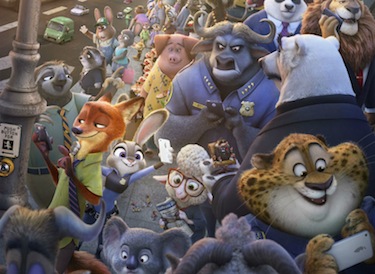It’s a truism that well-done children’s entertainment can do a better job teaching serious issues to both kids and adults then a thousand lectures ever could.
Disney’s animated films have a reputation for doing just that, especially in recent years with hits such as “Frozen,” “Inside Out” and “Up.” And with its latest film, “Zootopia,” the House of Mouse manages to say some interesting things about institutionalized racism while telling a fun, colorful story with talking animals.
In a world where humans don’t exist and all other mammals walk, wear clothes and talk, Judy Hopps (Ginnifer Goodwin) is a clever, optimistic little rabbit – don’t call her cute, only rabbits can call each other that – who dreams of being a police officer in the big city of Zootopia, a gleaming metropolis where predators and prey animals live and thrive in harmony. Everyone, even her own parents, tells her bunnies are timid fragile little things that have no place in the police force, but she ignores their doubts, graduates at the top of her class and reaches the city – only to immediately get stuck as a meter maid, because nobody considers her a “real cop.”
Desperate to prove herself, she forcefully enlists the aid of a cynical fox con artist named Nick Wilde (Jason Bateman) to help her solve a missing animal case with his contacts. The pair soon discover a conspiracy that threatens to tear Zootopia apart, and must face some ugly truths about themselves if they hope to stop it.
The art is breathtaking in both visuals and design. Someone took a lot of time to work out how a city populated by mammals of all shapes and sizes would be designed and function from day-to-day, and it all looks amazing. Different sections of the city resemble real life habitats, like the savannah and jungle, and there’s a section where the stores and buildings are tiny to accommodate the rodent population. There’s also minor details, like how trains have special compartments for different animals and juice bars have vacuum tubes for their giraffe customers, that give the impression of a much bigger world outside of this one city. It feels like if there was a Zootopia, it would look like this.
But while the look draws you in, it’s what the film is actually saying that keeps your interest. Zootopia’s society expects animals to act like their stereotypes – sly foxes, meek sheep, timid rabbits – and any animal that tries to go against this is met with derision. Judy is the most obvious example as she constantly has to fight for her fellow officers to take her seriously – “I’m not just some token bunny,” she tells her unimpressed superior – but we soon learn Phil is an example too, as he feels he became a scam artist because that’s all anyone would let a fox like him be. The analogies to real life stereotypes are obvious, while still applicable to many genders, races and belief systems. And in the third act it gets really interesting.
Far too often, kids’ movies, and for that matter movies in general, will present the complex issue of racism by trotting out a bigoted straw man and telling us we shouldn’t be like him – as if we needed the reminder. “Zootopia’s” biggest strength is it ignores that overt message for something more meaningful. It tells us kind, decent, honest people can still have racist assumptions, and you can spend your entire life struggling against other people judging you by what you are instead of who you are, only to realize you have been doing the same thing to other people all along.
People have an easier time learning when they’re enjoying themselves, and “Zootopia” is very enjoyable. The humor is great, the mystery is intriguing and the action is fast-paced and creative, and it’s all tied together with a message about the assumptions we make and how they can hurt others without our even realizing it.
And that message is important to everyone, be they man, woman, child or bunny rabbit.




